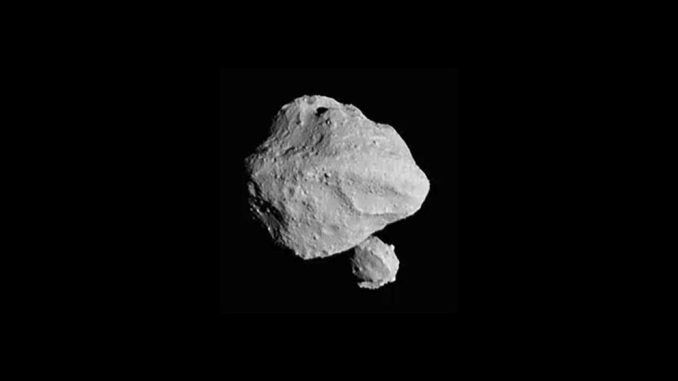
The little asteroid visited by NASA’s Lucy spacecraft this week had a big surprise for scientists _ a mini moon
ByMARCIA DUNN AP aerospace writer
November 3, 2023, 11:09 AM
This photo provided by NASA shows a photo taken by the Lucy spacecraft during Wednesday, Nov. 1, 2023 flyby of asteroid Dinkinesh, 300 million miles from Earth. It turns out Dinkinesh, which is only a half-mile across, has a dinky sidekick … just one-tenth of a mile across. This little companion was a surprise to everyone. (NASA via AP)
The Associated Press
CAPE CANAVERAL, Fla. — The little asteroid visited by NASA’s Lucy spacecraft this week had a big surprise for scientists.
It turns out that the asteroid Dinkinesh has a dinky sidekick — a mini moon.
The discovery was made during Wednesday’s flyby of Dinkinesh, 300 million miles (480 million kilometers) away in the main asteroid belt beyond Mars. The spacecraft snapped a picture of the pair when it was about 270 miles out (435 kilometers).
In data and images beamed back to Earth, the spacecraft confirmed that Dinkinesh is barely a half-mile (790 meters) across. Its closely circling moon is a mere one-tenth-of-a-mile (220 meters) in size.
NASA sent Lucy past Dinkinesh as a rehearsal for the bigger, more mysterious asteroids out near Jupiter. Launched in 2021, the spacecraft will reach the first of these so-called Trojan asteroids in 2027 and explore them for at least six years. The original target list of seven asteroids now stands at 11.
Dinkinesh means “you are marvelous” in the Amharic language of Ethiopia. It’s also the Amharic name for Lucy, the 3.2 million-year-old remains of a human ancestor found in Ethiopia in the 1970s, for which the spacecraft is named.
“Dinkinesh really did live up to its name; this is marvelous,” Southwest Research Institute’s Hal Levison, the lead scientist, said in a statement.
___
The Associated Press Health and Science Department receives support from the Howard Hughes Medical Institute’s Science and Educational Media Group. The AP is solely responsible for all content.


Be the first to comment